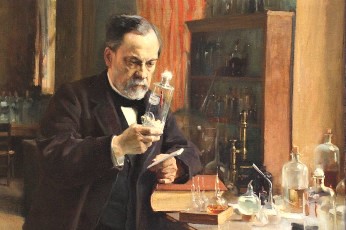Louis Pasteur? René Vallery-Radot? Jacques Orhon? Malcolm Kushner? Apocryphal?

Question for Quote Investigator: The famous French scientist Louis Pasteur has received credit for the following remark:
A bottle of wine contains more philosophy than all the books in the world.
I have been unable to find a good citation. Would you please help?
Reply from Quote Investigator: Louis Pasteur lived between 1822 and 1895. QI conjectures that the statement above evolved from a passage in a letter written by Pasteur in 1843.
René Vallery-Radot was Pasteur’s son-in-law, supporter, companion, and biographer. In November 1900 Vallery-Radot published an article in “Revue Politique et Littéraire: Revue Bleue” (“Political and Literary Review: Blue Review”) titled “La Vie de Pasteur” (“The Life of Pasteur”) which included the following. Boldface added to excerpts by QI:1
Nouvelle lettre au mois de décembre 1843, recommandation directe à son fils.
Dis à Chappuis que j’ai mis en bouteilles du 1834 acheté tout exprès pour boire à l’honneur de l’École normale, et cela pour les premières vacances. Il y a de l’esprit au fond de ces cent litres plus que dans tous les livres de philosophie du monde. Mais pour des formules de mathématiques, ajoutait-il, je crois qu’il n’y en a pas. Dis-lui bien que nous boirons la première bouteille avec lui. Soyez toujours de bons amis.
In 1900 Vallery-Radot published a biography of Pasteur which was translated from French to English in 1902 by Mrs. R. L. Devonshire. The following passage corresponded to the text above:2
Another letter, December, 1843, to his son this time: “Tell Chappuis that I have bottled some 1834 bought on purpose to drink the health of the Ecole Normale during the next holidays. There is more wit in those 100 litres than in all the books on philosophy in the world; but, as to mathematical formulæ, there are none, I believe. Mind you tell him that we shall drink the first bottle with him. Remain two good friends.”
Below are additional selected citations in chronological order.
Continue reading “Quote Origin: A Bottle of Wine Contains More Philosophy Than All the Books in the World”

